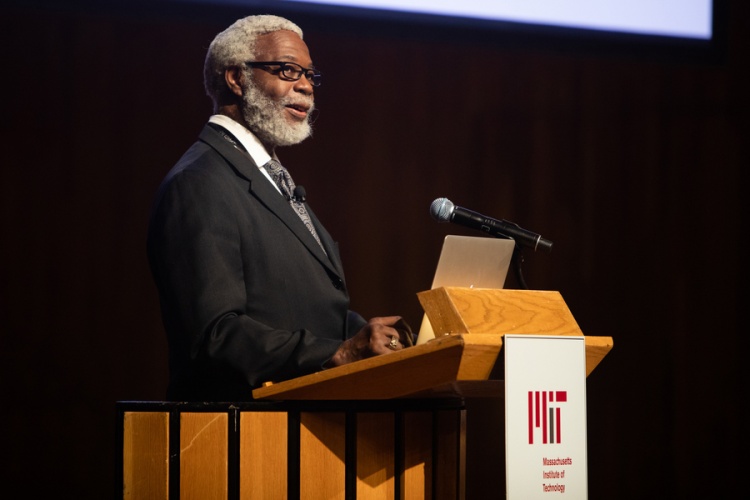Sylvester James Gates Jr. ’73, PhD ’77 recounts storied career in research, teaching, and service
Sylvester James Gates Jr. ’73, PhD ’77 recounts storied career in research, teaching, and service
MIT News

Photo: Jake Belcher | MIT News Office
Theoretical physicist and diversity advocate delivers the fall 2021 Compton Lecture
Jennifer Chu | MIT News Office
23 September 2021
Sylvester James Gates Jr. ’73, PhD ’77 [2010-11 MIT MLK Visiting Professor] has often described progress on diversity, equity, and inclusion as occurring at “blazingly glacial” rates.
The reknowned theoretical physicist was the featured speaker for this year’s MIT Compton Lecture, and he spoke on Tuesday to an appreciative audience, gathered and masked, in Kresge Auditorium. During his address, he chronicled his 52-year career in research, teaching, and service. He also noted moments in history when progress toward advancing civil rights simultaneously surged forward and rolled back.
“Those of us who read history are not surprised by where we are now,” Gates said.
He noted that following the Civil War, between 1865 and 1876, African American representatives were elected for the first time to the U.S. Congress. But this democratic momentum was met with a racist backlash, and after 1876 fewer Black politicians were able to gain office.
Meanwhile, in the world of academia, 1876 also marked the year when the first African American scholar — Edward Alexander Bouchet — received a PhD from an American university. Bouchet happened to earn his PhD from Yale University, in physics.
“So, at the same time opportunities for democracy were closing here for people of the African diaspora, physics allowed people who looked like me to earn a doctorate,” Gates said.
Casting forward to the present day, he described the current political climate as “fraught” and filled with disagreement over “who should be the beneficiaries of democracy, and who should sustain their denigrations.” Amid all this political uncertainty, however, he said he sees signs of increasing academic opportunity. Gates, who is the son of a soldier who never had the chance to go to college, now has a son and daughter who are each pursuing graduate and postgraduate studies in physics.
In addressing the MIT audience, he hoped that “democracy itself, for all citizens of this country, will also be held dear, and we will fight for them as hard as we fight for our science, technology, engineering, and mathematics.”